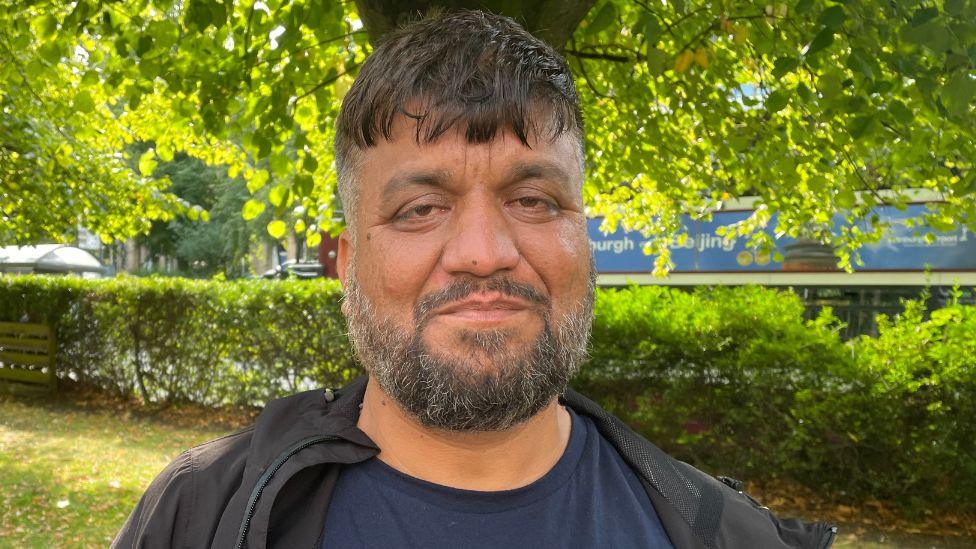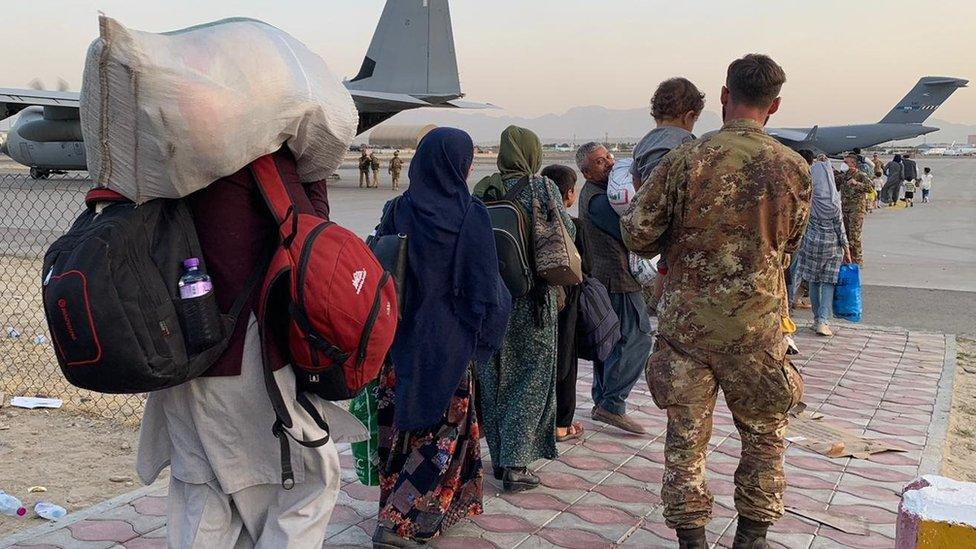Fears for Afghans refugees on deadline to leave hotels
- Published

Syed Maqbool Shah lived in a hotel for 14 months while waiting to secure accommodation
Afghan refugees in Scotland face a "grim" future unless suitable housing is provided for them, a charity has warned.
Thursday is the Home Office deadline for Afghans to leave hotels they have been living in following the Taliban takeover of their country in 2021.
While some have found homes, the Scottish Refugee Council said others risk being "forgotten about".
The Home Office said it was working with councils to support the refugees.
About 15,000 people were airlifted to the UK after the Taliban regained power in Afghanistan in August 2021 as part of Operation Pitting.
This included British nationals as well as people who had worked with the UK in Afghanistan and their family members.
Those who had nowhere to live were placed in hotels, including sites in Aberdeen, Fife and Edinburgh.
The Home Office said this was intended to be temporary accommodation, but by the end of March there were still about 8,800 Afghans living in hotels in the UK.
Earlier this year the Home Office started issuing notices to quit, with a deadline of 31 August for Afghans to leave the hotels.
While some have now found accommodation, concerns have been raised over those who are still struggling to find homes, including in Scotland.

About 15,000 people were evacuated to the UK following the Taliban takeover of Afghanistan
Syed Maqbool Shah worked as an interpreter in Afghanistan before fleeing to Pakistan in October 2021 to escape the Taliban.
The 42-year-old has lived in a hotel in Edinburgh with his family for the past 14 months. He is moving into a hotel in Glenrothes while accommodation for his family in Rosyth is furnished.
He told BBC Scotland he was "grateful" for help from Edinburgh Council but described living in a hotel as a "horrible life".
"It's really difficult to stay in a hotel," he said.
"It's really hard and really bad, because our people aren't educated too much. Because we have come here and can't speak English, our people.
"And they can't go to the local authority or find a property dealer for them to find their own property. It's really hard for them and they can't manage that. They can't."
Although his daughters had missed out on two years of schooling, they have become fond of their new home, he added.
"My girls are happy, they like their country, they love this country. There is a future for this country, not for our country."
Sabir Zazai, the chief executive of the Scottish Refugee Council, said it was unacceptable for Afghans to have been living in hotels for more than two years.
He said he feared many now faced an uncertain and potentially "grim" future, and called for a "dignified" community-based integration approach centred on human rights.
"The journey of integration for those people has not started - you cannot start developing a sense of belonging in the back of a hotel room," Mr Zazai told BBC Scotland News.
The Scottish Refugee Council has also campaigned for an end to what it says is a "cruel" UK government policy potentially requiring refugees and asylum seekers to share hotel rooms.
A recent report by Aberdeen Health and Social Care Partnership said there were currently 503 refugees and asylum seekers locally, with the numbers increasing "week on week".
It said it anticipated this would continue until all hotels in the city were full and that there was an ongoing discussion with the Home Office about room sharing.
Mr Zazai called for the UK government to focus on clearing the backlog of asylum cases and urged Humza Yousaf to take action in Scotland.
He added: "We also urge the first minister to personally intervene now and instruct his government to identify and pursue all legal and policy options to stop this inhumane forced bedroom sharing happening in Scotland.
"This is not in line with who we are, this is not in line with Scotland's tradition of fair and inclusive society."
Aberdeen City Council said it was supporting 18 Afghan households to find a home and that more than half had secured accommodation.
Fife Council said it had hosted 205 people in a bridging hotel since September 2021.
A spokesperson told BBC Scotland two families were still looking for homes; one had interim accommodation, while the other had now been allocated accommodation and would remain in the hotel until it was ready.
City of Edinburgh Council said its teams were working with 241 Afghans. The local authority said 34 people remained in hotel accommodation, but all had confirmed onward accommodation and they were due to leave the hotels this week.
'Turbulent time'
The Scottish government said Afghan families had been welcomed by local authorities across Scotland and were being supported to access services and integrate into communities.
"We continue to engage with the UK government to ensure that Afghan families can be matched with property offers made by local authorities as soon as possible," a spokesperson said.
"However, it is not acceptable that as a result of the upcoming hotel closures programme, families could be evicted from government provided accommodation into homelessness."
The Scottish government agreed that room sharing "adds risk and stress for people at an already turbulent time" and called for the UK government to improve the efficiency of the asylum system.
A Home Office spokesperson said a total of 10,500 Afghans had been provided with homes.
"We have worked closely with local authorities and NGOs on the hotel departures, and we are all in agreement this is the right thing to do for the taxpayer, and for Afghans," a spokesperson said.
Related topics
- Published12 June 2023

- Published27 October 2021

- Published29 October 2021
